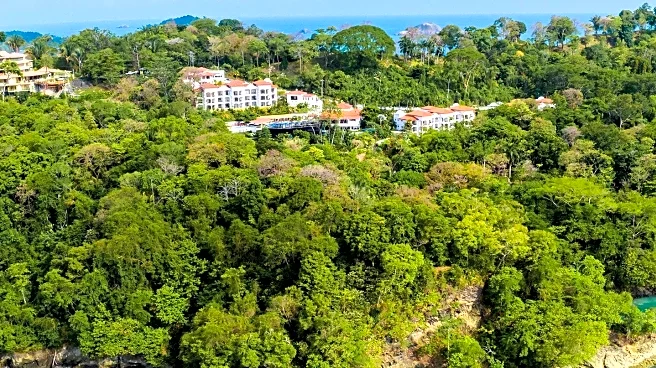What's Happening?
A luxury resort in Costa Rica, The W Costa Rica Reserva Conchal, is attracting Americans interested in the Blue Zone diet, which is known for promoting longevity. The Nicoya Peninsula, one of the world's original Blue Zones, is renowned for its residents' long lifespans, attributed to a diet rich in whole, natural ingredients like corn, beans, and squash. The resort offers a five-star dining experience inspired by these traditional dishes, emphasizing health-focused culinary practices without additives. The local water, high in calcium and magnesium, along with a lifestyle of outdoor activities, contributes to the region's reputation for longevity.
Why It's Important?
The interest in the Blue Zone diet reflects a growing trend in wellness tourism, where travelers seek destinations that offer health benefits through diet and lifestyle. This trend has significant implications for the hospitality industry, as resorts and hotels may increasingly focus on offering health-conscious dining options to attract guests. The diet's emphasis on plant-based foods and minimal red meat consumption aligns with broader shifts towards sustainable and health-focused eating habits. This could influence public health policies and dietary guidelines, promoting longevity and reducing healthcare costs associated with diet-related diseases.
What's Next?
As more Americans become aware of the benefits of the Blue Zone diet, similar resorts may emerge, offering health-focused experiences. The hospitality industry might see an increase in demand for wellness tourism, prompting more establishments to incorporate local, sustainable food practices. Additionally, there could be a rise in educational programs teaching guests how to integrate these dietary principles into their daily lives. This trend may also inspire research into the health benefits of traditional diets, potentially influencing nutritional science and public health recommendations.
Beyond the Headlines
The Blue Zone diet's popularity highlights a cultural shift towards valuing traditional and sustainable food practices. It raises ethical considerations about food sourcing and the impact of tourism on local communities. As resorts capitalize on these diets, they must balance commercial interests with preserving cultural heritage and supporting local economies. The trend also underscores the importance of environmental sustainability in food production, as the demand for natural ingredients grows.










